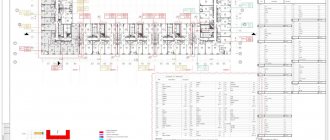Ownership gives you the opportunity to dispose of property as you wish. You can sell, donate or bequeath the apartment. However, any real estate transaction has its own nuances that you need to know about in advance. Any owner or recipient of housing is interested in the profitability of the transaction, and accordingly is interested in how to re-register an apartment and not pay taxes. This option is possible if you sign the transfer of ownership rights to relatives. Which relatives fit this category, and what is the best way to transfer the apartment?
Who is a close relative
The transaction of purchase and sale of an apartment, gift or will is the subject of the receipt of real estate or its sale, which in both cases is considered income. According to the Tax Code, any type of income is taxed. The income tax rate is 13% and is calculated on the assessed amount of the property. The only exception is property transferred to close relatives. In this case, the transaction is exempt from taxation and income tax does not have to be paid.
Now it remains to identify a group of citizens who are classified as close relatives by law. Since many people confuse this concept and attribute all blood relatives here. So, according to Article 14 of the Family Code, a close relative is:
- children (including adopted children);
- parents (including adoptive parents);
- siblings;
- grandmothers, grandfathers.
According to the Housing Code and the Criminal Procedure Code, spouses are also included in the list of close relatives, however, the Tax Code, when distributing taxes, refers exclusively to the provisions of Article 14 of the RF IC. This means that spouses do not belong to this category.
The above list is complete. Under no circumstances include the following relatives here, otherwise taxation when re-registering an apartment cannot be avoided:
- uncles and aunts;
- nephews and nieces;
- cousins;
- great-grandparents.
Now familiarize yourself with the features of re-registration of an apartment by the above-mentioned relatives (close ones):
- If a spouse becomes the owner, then, depending on the type of transfer of real estate, the property may be considered joint or personal property, but tax will have to be paid, regardless of the method of transfer of the apartment.
- Despite the fact that adopted children, parents, brothers/sisters are not of the same blood, they still belong to the category of close relatives, which means they avoid paying tax.
- Half-siblings (only one parent each) also belong to the preferential group of citizens.
- Other persons who were listed in Article 14 of the RF IC can transfer ownership of an apartment to their relative without paying tax.
However, it is worth making an amendment right away, even if close relatives are the participants in the transaction, the 13 percent tax charge can be avoided only with a certain method of transferring property - under a gift or inheritance agreement. Drawing up a standard procedure for a purchase and sale agreement will not allow you to evade the state contribution, since the terms of the agreement imply the transfer of money, which means receiving profit, which must be taxed.
Methods for re-registration of real estate
The nuances of re-registration of housing for a spouse, grandchildren, brothers, sisters and parents
Let's look at each case in turn.
What is the best way to re-register an apartment in the name of a spouse? Of course, with the help of a real estate purchase and sale agreement, in this way you will bypass a tax deduction in the amount of 260 thousand rubles.
What is the best way to re-register an apartment for brothers/sisters/grandchildren? Using the same agreement and registration of a deed of gift. Also, the best option would be to write a will.
If the spouses are married, then in this case it is possible to draw up a document that provides for property division.
Re-registration methods
It doesn’t matter for what reasons the apartment is transferred to another relative, the main thing is to determine the correct type of transaction in which neither the owner nor the recipient of the apartment will have to pay income tax. According to the law, this is possible only in two cases: by will or when drawing up a gift agreement. Since in both cases the transfer of real estate occurs regardless of the will of the recipient, accordingly, he is not intended to receive benefits or income.
Donation
A deed of gift or gift agreement is a document that regulates the transfer of property from the donor to the recipient free of charge, that is, as a gift. Moreover, the second party, the recipient, should not mind accepting the subject of the agreement as a gift. A special feature of a deed of gift is that its decision cannot be challenged by other relatives (as can happen with a will). If it is discovered that the transaction was concluded upon reimbursement of a certain amount of money, in order to “circumvent” taxation, then the agreement may be invalidated.
You can donate real estate without paying tax only if you transfer the apartment to a relative. To do this, just contact a notary office with your passport and real estate documents. In front of you, the notary will draw up an agreement where there will be a change of ownership. The donation agreement will contain the following information:
- data of the parties to the transaction;
- the purpose of the transaction is the donation of real estate;
- method of possession;
- object of donation – apartment;
- technical characteristics of the apartment;
- cadastral value of the immovable property;
- methods of transfer of ownership rights;
- other conditions governing the legal relations of the parties;
- date, signature.
Next, the deed of gift is endorsed by a notary, after which the still existing owner applies to Rosreestr and registers the transaction. He will only need to pay the established amount of state duty - 2,000 rubles according to the Tax Code as of 2021. Now the registration of an apartment in the name of a relative under a gift deed can be considered completed. And if the recipient is not recognized as a relative by law, then in addition to the state duty, he will have to pay a tax of 13%. Taxation is applied to the assessed value based on the sales price of similar apartments.
The main advantage of registering an apartment in the name of a relative without tax under a deed of gift is its sole ownership. That is, a spouse cannot claim this type of property after a divorce if the apartment was received during marriage, as well as other heirs of the donor. According to the Civil Code, any type of property received under a gift agreement is considered personal property and is not subject to division.
Another distinctive feature of the deed of gift is that the donor can note the transfer of ownership rights to the donee if the other has committed a crime against the former owner of the apartment or threatens him.
Inheritance
An inheritance agreement or will is a document that is drawn up during the life of the testator and comes into force after his death. An agreement for the transfer of an apartment can only be concluded by a legally capable owner. Heirs can be either relatives or any other person. The contract is drawn up by a notary, where ownership is established upon the occurrence of certain circumstances. The following documents will be required from the testator:
- passport;
- title documents for real estate;
- technical documentation apartment;
- paper from the cadastral department;
- extract from the housing office about registered residents.
The document is certified by the signature and seal of a notary, and then registered in the register. A will can be drawn up for a minor child, and unlike a deed of gift, permission from the legal representative is not required. Property rights can be transferred to another person only after the death of the owner of the apartment. The person indicated in the will is the sole owner, as in the deed of gift, and the apartment itself is also not subject to division.
As for tax contributions, close relatives are exempt from paying personal income tax, but in order to re-register an apartment, you need to pay a state fee. Compared to a gift agreement, its size here will be much higher. The amount of the state duty depends on the degree of relationship with the testator: for the first line of relationship you will need to pay 0.3% of the appraised value of the apartment, and for all others - 0.6%. There are also restrictions on the maximum allowable amount of state duty, which are fixed in Article 333.24 of the Tax Code.
Non-notarized transaction execution
Separately, it is necessary to highlight such a concept as non-notary registration of transactions involving the transfer of an apartment to a relative. This method is interesting when you need to save time and money, and also when the owner is thinking about the possibility of canceling the contract in the future. However, this is very risky, since the role of the notary is quite large, because he:
- Helps to check the correctness of documents and their complete composition;
- Bears responsibility before the law for the transaction you enter into;
- Helps to draw up a contract correctly.
https://www.youtube.com/watch?v=aGpLYP-5npI
Refusal of legal services allows you to minimize the costs of the transaction (any re-registration of real estate to another owner is a transaction, even if it is a gift). Similarly, close blood relationships and the choice of contract option reduce costs. If it is gratuitous, it exempts you from taxes completely or almost completely; if it is paid, the amounts increase if necessary.
Possible risks
What problems can you encounter when re-registering an apartment under a will or gift agreement?
- Firstly, it is important to correctly determine the circle of people who belong to the category of “close relatives” according to the Family Code, and not based on your personal relationship and closeness with the person.
- Secondly, a will can be contested. Other heirs can do this if they consider that the inheritance agreement was signed under threat or in a state of mental deviation, which does not reflect the real expression of will.
The inheritance is contested through the courts. Most often, these types of claims are obviously unsuccessful if the applicant does not have significant evidence that the document was signed under threat to life or health, or simply the closest relatives do not agree with the fairness of the decision of the deceased. As for the deed of gift, it is not subject to challenge or only in cases where the participants in the transaction hid the purchase and sale transaction behind the gift agreement in order to evade tax.
Thus, before re-registering this or that type of property, evaluate all the advantages and disadvantages of each transaction. If close relatives are participants in the process, then they are subject to preferential conditions and are exempt from paying tax under a gift or inheritance agreement. If you want to re-register an apartment in the near future, then this can only be done through a deed of gift, since the will comes into force only after the death of the signatory.
Minimizing costs
When it comes to minimizing costs, it all depends on what exactly you want and your individual situation. For example, if you want to reduce costs for your relatives, this can be easily done using the same deed of gift, but for you there are no costs as such, other than the loss of real estate. The only significant expense item is payment for legal and notary services. However, the situation here is ambiguous.
On the one hand, you can prepare all the documents yourself, accompanying each stage personally, spending money actually only on notarization of important contracts. On the other hand, by refusing the same counseling, you can do everything wrong, having negative consequences in the near future. Therefore, before making a final decision, weigh everything twice and determine whether you can independently cope with all the tasks as it should be.
Legislative acts of the transfer procedure
The donation of a share of an apartment to a spouse, as well as the usual procedure for the gratuitous transfer of property, is regulated by Article 572 of the Civil Code of the Russian Federation and other paragraphs of this code, but in matters that are contrary to donation, when the apartment is considered jointly acquired property, certain norms of the family code that determine the property rights of spouses are applied.
According to Art. 34 and 39 of the RF IC, when defining an apartment as jointly acquired property, it is possible to donate a share of real estate, but in the amount of no more than half of the total area of housing .
List of required documents
To rationally conclude a transaction of donating a share of an apartment to a spouse, you will need the following documents:
- Identification documents of both spouses (passports).
- Marriage certificate.
- Property papers confirming the right to own certain shares of the apartment.
- Housing cadastral number.
- Technical passport for the apartment with the current layout and a separate plan of the territory that is being donated.
- Documentary information about the residents registered in the apartment.
- A paper confirming the absence of debt obligations on the property that they plan to donate.







